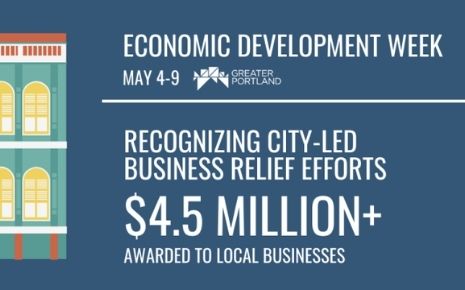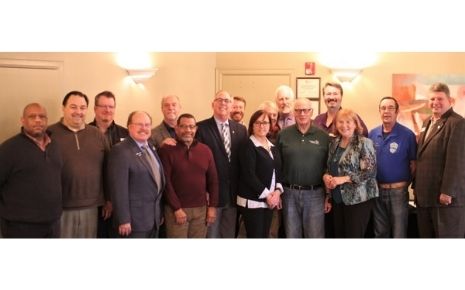Economic Development Week: GPI Highlights Business Support Efforts, Creative Company Pivots

4 May 2020
GPI in the News
May 4-9 marks Economic Development Week, created by the International Economic Development Council to increase awareness for local programs that create jobs, advance career development opportunities and increase the quality of life in communities everywhere.
Each day this week, GPI will highlight innovative responses to the economic crisis from around the region, including city-led relief efforts and creative pivots by companies. Follow us on Twitter, LinkedIn, Facebook and Instagram to see how our region has responded, and check back here for daily updates.
Monday: City-led efforts to support local businesses (grants and loans)
- Beaverton
- Established two rounds of grant funding to assist businesses with commercial rent or mortgage expenses. The second round was awarded to qualified applicants in a random lottery.
- Gresham
- Created a $400,000 fund to provide grants to food and beverage businesses required to close on-site dining.
- Happy Valley
- Established a $300,000 grant fund to provide lease, rental, or mortgage assistance to small businesses, awarded on a first-come, first-served basis.
- Hillsboro
- Issued two rounds of grants totalling more than $1 million for local small businesses. Grant applications were reviewed by a panel of community partners, including the Hillsboro Chamber of Commerce, Centro Cultural de Washington County, and the City of Hillsboro.
- Lake Oswego
- Created a $250,000 fund that disbursed grants to small businesses, awarded on a first-come, first-served basis.
- Oregon City
- Established a $200,000 debt relief fund for local small businesses.
- Portland (via Prosper Portland)
- Partnered with APANO to provide $140,000 in grants for businesses in the Jade District and Old/Town Chinatown. Applications were available in English, Chinese, Vietnamese, and Spanish, and a weighted point system was used to select awardees.
- Established a $2 million fund to provide $1 million in grants and $1 million in loans to local small businesses. Contributions from local banks increased the available grant funding to more than $1,300,000. Prosper Portland worked with community development financial institutions to disburse the grant money to small businesses in late April. Prosper also shared demographic data on awardees.
- Sherwood
- Provided two rounds of grant funding totalling $300,000 for local small businesses.
- Tigard
- Partnered with Micro Enterprise Solutions of Oregon (MESO) to award grants to small businesses with limited access to commercial banks and federal support.
- Tualatin
- Established a $250,000 fund to disburse grants to small businesses, awarded using a weighted point system.
- Wilsonville
- Created a $400,000 grant fund for small businesses and hotels, awarded using a point system for weighted criteria.
- Wood Village
- Established $140,000 utility relief fund for residents and small businesses to assist with utility bills from the city, PGE and NW Natural.
Tuesday: City-led efforts to support local businesses (technical assistance, creative solutions)
- The Columbia River Economic Development Council (CREDC) has hosted a series of business resource calls featuring experts on the CARES Act, SBA loans, public contracts and more.
- The City of Sherwood created a volunteer business mentoring group that helped businesses apply for the SBA’s PPP and EIDL programs.
- Lake Oswego and Gresham established business assistance teams to help connect business owners with state and federal resources.
- The City of Wilsonville purchased $20,000 in gift cards from local restaurants and donated them to Wilsonville Community Sharing to provide meals for people in need.
- Oregon City disabled its downtown parking meters.
- Lake Oswego is waiving fees for business licenses renewals.
- The City of Vancouver has designated May “Support Small Business Month," offering a calendar of workshops and featuring positive stories on local businesses.
- Prosper Portland partnered with Grubhub to defer the collection of commission payments for impacted independent restaurants.
Wednesday: Company efforts to manufacture personal protective equipment and hand sanitizer
- Paula Hayes, owner of Beaverton cosmetics company Hue Noir, started making hand sanitizer after her cosmetics sales fell dramatically. Demand for the sanitizer has been overwhelming. As of April 1, she had produced 25,000 units.
- Vancouver screen printing equipment manufacturer Ryonet has pivoted to making PPE for hospitals, including face shields, face masks, sneeze guards, floor screens and medical carts.
- Tom Burkleaux, owner of New Deal Distillery and president of a trade group of central Portland distilleries, said the distilleries jumped at the chance to make alcohol-based hand sanitizer. They’ve been working with the Oregon Health Authority and Moda Health to secure sanitizer for hospitals.
- A group of 3-D printing advocates led by Intel manager Shashi Jain organized Makerforce, a crowdfunded pop-up supply chain that enables anyone with a 3-D printer to produce PPE components for local hospitals.
- Portland footwear maker Keen converted a production line at its factory in Thailand to produce face masks. Keen donated 100,000 masks to front-line workers, including Fred Meyer grocery store workers. Now, Keen is designing a full line of masks available to purchase.
- In Hillsboro, Qorvo Semiconductor is manufacturing face shields, safety glasses, Tyvek coveralls and other specialized PPE, including medical O2 tubing, non-rebreather masks, nasal cannulas and CPR Pocket Masks.
Thursday: Companies responding to the pandemic with creative products or business models
- Nat West, founder of Portland's Reverend Nat’s Hard Cider, used to sell his ciders to bars and grocers through a distributor, but when those orders fell, he shifted to a direct-to-consumer delivery model. He’s been able to hire all of his staff back and appreciates this new direct communication with customers.
- Oregon City Farmers Market shifted to a pre-order drive-thru market, and posted vendor contact information on its website.
- Portland record standby Music Millennium is offering curbside service or mail delivery, and markets a Curbside Deal of the Day on its Facebook page.
- St. Helens historic Columbia Theatre doesn’t have showtimes anymore, instead offering $5 buckets of popcorn for pickup on Friday nights, as well as a mystery poster and bucket deal for $20. The theater sells hundreds of buckets every Friday.
- Portland’s Afuri now offers DIY ramen kits for delivery and takeout. The kits include cooking instructions and individually portioned ingredients, allowing customers to recreate the signature Afuri Yuzu Shio Ramen at home.
- Act V Theaters in Cornelius is offering drive-in movie screenings on the side of their theater, with patrons staying in their cars. This weekend, it’s screening “Groundhog Day.”
Friday: Community-led collaborations
Gift card purchasing efforts: Built Oregon, Greater Vancouver Chamber of Commerce, PDXSOS and Float have each developed a platform that makes it easy for community members to purchase gift certificates from participating businesses.
Platforms to offer and request assistance: BBPDX Switchboard and Connecting Dots PDX enable users to connect with those who can help them with specific needs, from user testing and website development to contract work and donations.
Virtual tip jars: The Hillsboro Chamber of Commerce and Jacqi Ko, a manager at Portland bar Hey Love, have created virtual tip jars to allow community members to support laid-off service industry workers.
GoFundMe: Greater Portland community members have collectively donated hundreds of thousands of dollars to individual businesses' campaigns on the crowdfunding platform.
More Topics




